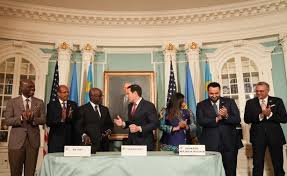- Details
- East Africa
- 637
Today, the United States is sanctioning armed groups carrying out illegal mining and supply chain actors profiteering from conflict minerals in eastern Democratic Republic of the Congo (DRC). The Department of the Treasury is designating four entities producing and trading in conflict minerals in Rubaya, an expansive mining area rich in critical minerals.
Today's sanctions impose consequences on actors who destabilize the eastern DRC. They target one of many armed groups carrying out illegal mining operations including through forced labour and violence against civilians. They also counter companies in the DRC and China that partner with armed groups to profiteer off instability to steal the mineral wealth of the DRC. Today, the United States is sending a clear message that no armed group or commercial entity is immune from sanctions if they undermine peace, stability, or security in the DRC.
Through the U.S.-mediated peace process, especially the Regional Economic Integration Framework, the United States supports the DRC and Rwanda in building a more peaceful and prosperous future. The United States is resolved to end the exploitation of conflict minerals in the Great Lakes region. The U.S. government will continue to take action to support a mining sector that contributes to lasting stability and economic development in the Great Lakes region and secure, reliable global critical minerals supply chains.
The Department of the Treasury's actions were taken pursuant to E.O. 13413, as amended, which authorizes the imposition of sanctions on persons who have engaged in activity which threatens the peace, security, or stability of the DRC or supported persons that are involved in such activities, including through the illicit trade in natural resources of the DRC.






